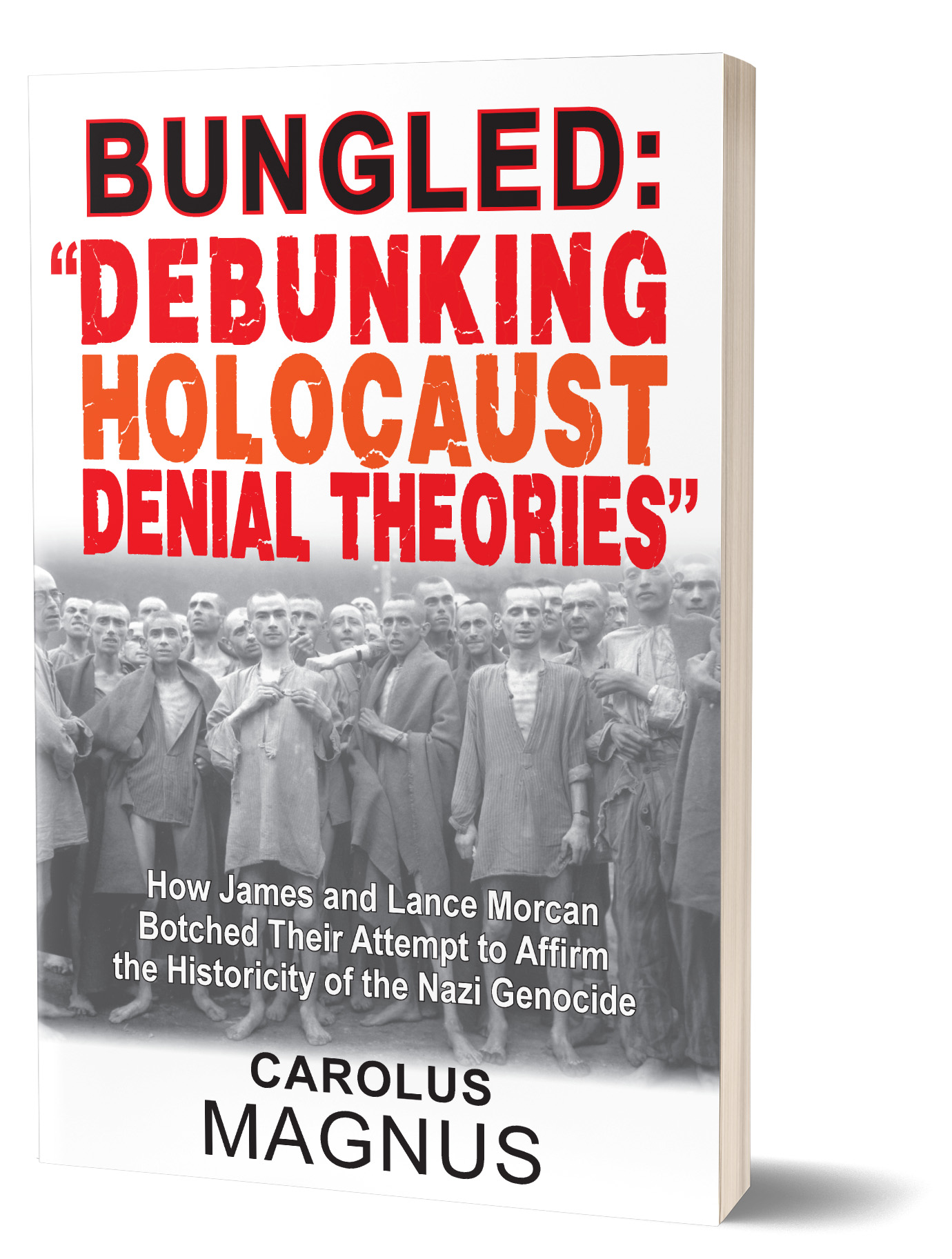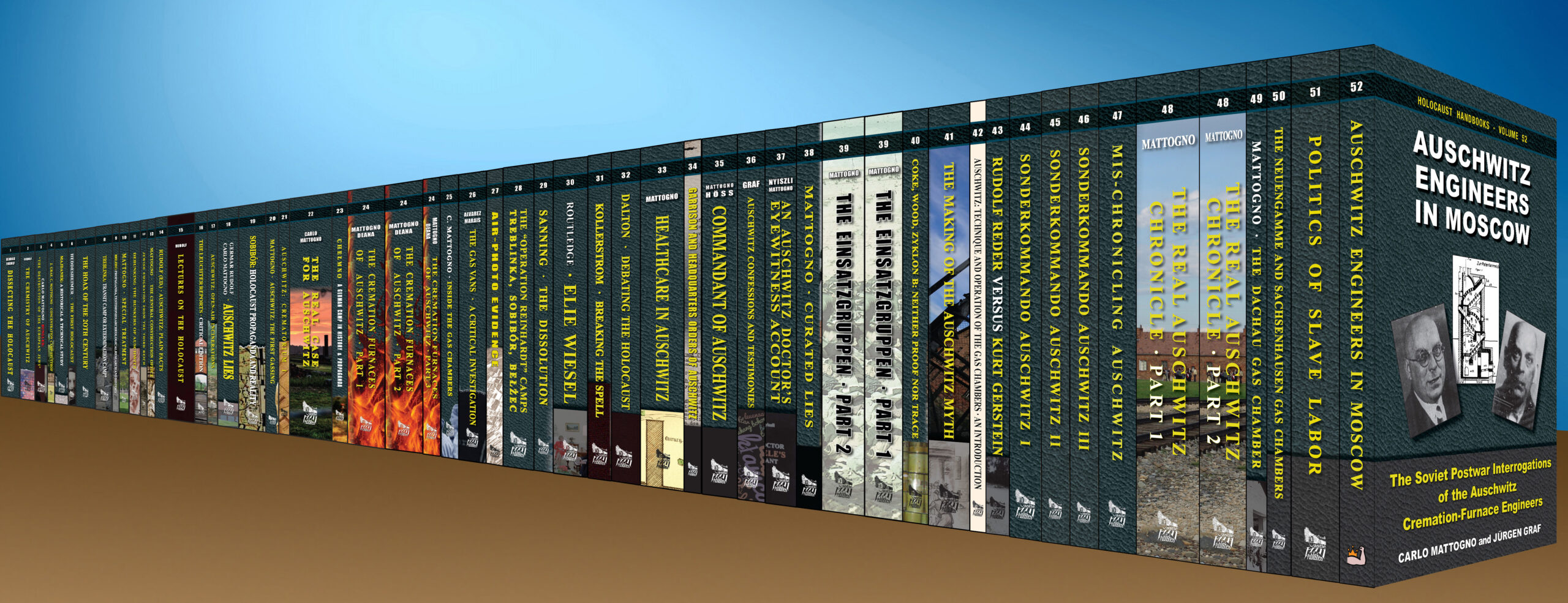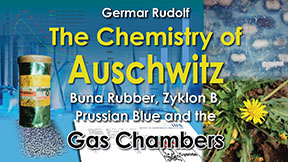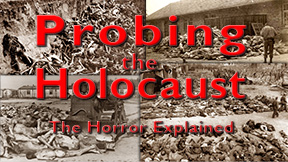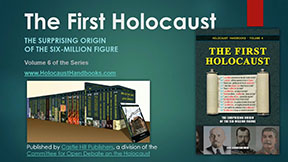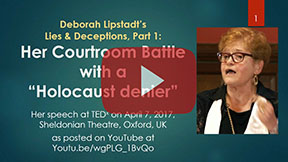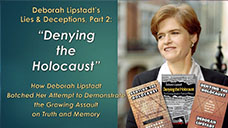When you go to Amazon and pull up James and Lance Morcan’s book Debunking Holocaust Denial Theories, here is what comes up (see the cover to the left of July 14, 2016):
“Debunking Holocaust Denial Theories […] aims to end the denial once and for all by tackling the bizarre phenomenon head-on.
Written in close consultation with Holocaust survivors and World War Two historians, no stone is left unturned in meticulously verifying the historical facts of the genocide. The Morcans present a wide array of sources including Nazi documentation, eyewitness accounts, scientific reports and shocking photographic evidence to shut down the debate deniers wish to create.
One by one, the various arguments Holocaust deniers use to try to discredit wartime records are carefully scrutinized and then systematically disproven. […]”
When I read that description, I thought this may finally be a book that really addresses what the devious revisionists a.k.a. “deniers” have put out over the past 25 years of prodigious productivity.
 My past experiences have taught me, however, that mainstream historians almost always strongly advise against discussing serious revisionist arguments. Doing so would lend them credence, would suggest to the reader that they deserve to be taken seriously, and would concede that a real academic debate about the Holocaust is indeed needed. That’s a big no-no in orthodox academic circles, so big, indeed, that breaking this “don’t touch it!” taboo can get you in serious trouble.
My past experiences have taught me, however, that mainstream historians almost always strongly advise against discussing serious revisionist arguments. Doing so would lend them credence, would suggest to the reader that they deserve to be taken seriously, and would concede that a real academic debate about the Holocaust is indeed needed. That’s a big no-no in orthodox academic circles, so big, indeed, that breaking this “don’t touch it!” taboo can get you in serious trouble.
I asked the leading revisionist expert on the Holocaust, Italian scholar Carlo Mattogno, to read the book and to subject it to his thorough criticism. The present book is the result of this request.
 Mattogno’s conclusions are devastating. They confirm once more that mainstream authors simply won’t address revisionist arguments. The Morcans’ book is merely another example of that ostrich-like policy – or mayby it’s more accurately described with the image of the infamous three monkeys: They refuse to listen, to look, to debate.
Mattogno’s conclusions are devastating. They confirm once more that mainstream authors simply won’t address revisionist arguments. The Morcans’ book is merely another example of that ostrich-like policy – or mayby it’s more accurately described with the image of the infamous three monkeys: They refuse to listen, to look, to debate.
Even when these knights in shining armor riding out to slay the wicked revisionist dragon claim that they will really, seriously, honestly refute all the deniers’ arguments, as Morcans’ book description claims, they simply engage in shadowboxing, creating some imaginary, bogus revisionist scarecrow – an assembly of distorted or completely invented alleged “denier” arguments – which they then tear to pieces to the cheering of the audience.
That’s what their book is all about. And you are holding in your hands the rebuttal to prove it.
Nowadays, any book talking about “Holocaust Denial” has to first and foremost address the arguments laid out in the almost 40 volumes of the growing series Holocaust Handbooks (accessible at Holocaust Handbooks.com). Any such “debunking” needs to have its main focus also on the many papers and monographs written by Carlo Mattogno, whose knowledge on the Holocaust may be second to none, and that not only includes the revisionists, but probably also all orthodox Holocaust historians worldwide.
In the Morcans’ book, however, you will search in vain for the name Carlo Mattogno. Although the authors mention one of his books (Auschwitz: The First Gassing, Vol. 20 of the Holocaust Handbooks)[1] and one of his – today hopelessly outdated – papers (the 1988 article “The Myth of the Extermination of the Jews,”[2] which they falsely identify as a book), they neither give the author’s name, nor do they address any of the arguments laid out in these works. In addition, their claim that these are among the “more popular” revisionist books is certainly wrong. Auschwitz: The First Gassing, for instance, is a veritable shelf-warmer, as Amazon’s sales ranking shows, and two of the other three works they list are merely brochures.[3]
But be that as it may, when refuting revisionist publications, what counts isn’t sales ranking but relevance and competence. The really important books on the Holocaust by mainstream historians aren’t bestsellers either. You moreover don’t have to be a rocket scientist to find out which revisionist books are really relevant. But then again, distracting the reader from the really tough, convincing revisionist arguments while claiming to refute them was probably the Morcans’ primary purpose in publishing their book.
Debunking Holocaust Denial Theories is therefore merely another work produced by a set of deliberately autistic fiction writers – because that’s actually what the Morcans do for a living – can you tell?
Germar Rudolf, Red Lion, June 26, 2016
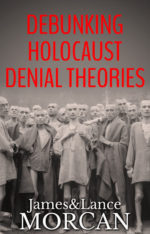 P.S: Initially, Morcans’ book was available only as a Kindle edition. Its contents can be changed by the authors at any time. For instance, the version analyzed here, downloaded in May 2016, had a different cover than the one shown above; see the image at the right.
P.S: Initially, Morcans’ book was available only as a Kindle edition. Its contents can be changed by the authors at any time. For instance, the version analyzed here, downloaded in May 2016, had a different cover than the one shown above; see the image at the right.
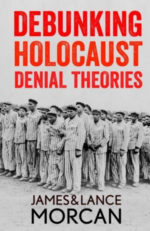 On July 15, 2016, however, the print edition of Morcans’ book appeared, published by Sterling Gate Books—coincidentally on the very same day the print edition of the present book appeared (where we still—and now erroneously—claim that Morcans book exists only as a Kindle edition). We can only assume that the contents of Morcans’ print edition are very similar to, if not identical with, the Kindle edition. Its cover artwork is again different, though, see on the left.
On July 15, 2016, however, the print edition of Morcans’ book appeared, published by Sterling Gate Books—coincidentally on the very same day the print edition of the present book appeared (where we still—and now erroneously—claim that Morcans book exists only as a Kindle edition). We can only assume that the contents of Morcans’ print edition are very similar to, if not identical with, the Kindle edition. Its cover artwork is again different, though, see on the left.
Notes
[1] 3rd ed., Castle Hill Publishers, Uckfield 2016.
[2] Part 1: The Journal of Historical Review, Vol. 8, No. 2 (summer 1988), pp. 133-172; Part 2: ibid., No. 3 (fall 1988), pp. 261-302.
[3] Richard Harwood’s Did Six Million Really Die? (Historical Review Press, multiple editions since 1974), and Peter Winter’s The Six Million: Fact or Fiction? (although by now, in its 5th edition, it has been inflated to a 8.5×11 paperback). The only really popular book deserving that name which the Morcans list is Arthur R. Butz’s 1976 evergreen The Hoax of the Twentieth Century: The Case against the Presumed Extermination of European Jewry (4th ed., Castle Hill Publishers, Uckfield 2015).

